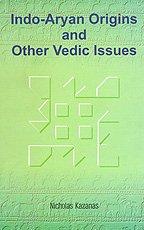Indo-Aryan origins and other Vedic issues
Indo-Aryan origins and other Vedic issues is backordered and will ship as soon as it is back in stock.
Couldn't load pickup availability
Genuine Products Guarantee
Genuine Products Guarantee
We guarantee 100% genuine products, and if proven otherwise, we will compensate you with 10 times the product's cost.
Delivery and Shipping
Delivery and Shipping
Products are generally ready for dispatch within 1 day and typically reach you in 3 to 5 days.
Book Details
-
Publisher: ADITYA PRAKASHAN Indological Publishers & Booksellers
-
ISBN-13: 9788177421156
-
ISBN-10: 8177421158
-
Edition: New Delhi
-
Year: 2017
-
Language: English
-
Subject: History, Texts
About the Book
This book presents a series of studies by a renowned Greek Indologist, focusing on the complex issue of Indo-Aryan origins, with a solution grounded in indigenism. The studies explore various facets of the Indo-European common heritage and the Vedic tradition, offering fresh insights into the interconnections between early cultures.
One study examines the position of early Hittite culture in relation to other Indo-European branches, particularly Vedic traditions, while another traces common deity names across different Indo-European cultures. Two additional studies compare Vedic traditions with Mesopotamian and Egyptian cultures, respectively, highlighting shared themes and practices.
Focusing on purely Vedic issues, the book also delves into topics such as the religio-philosophical thought in the Vedas and the real meanings of terms like "pur" (defensive structure) and "samudra" (ocean). These studies present the Vedic inheritance as the oldest Indo-European tradition, older than even the Near Eastern cultures, with the bulk of the Rigveda hymns believed to have been composed in the 4th millennium BCE.
The book provides a comprehensive analysis based on linguistic, literary, anthropological, archaeological, and genetic evidence, revealing that Indo-Aryans have been residing in North-West India (and present-day Pakistan) since approximately 5000 BCE.





